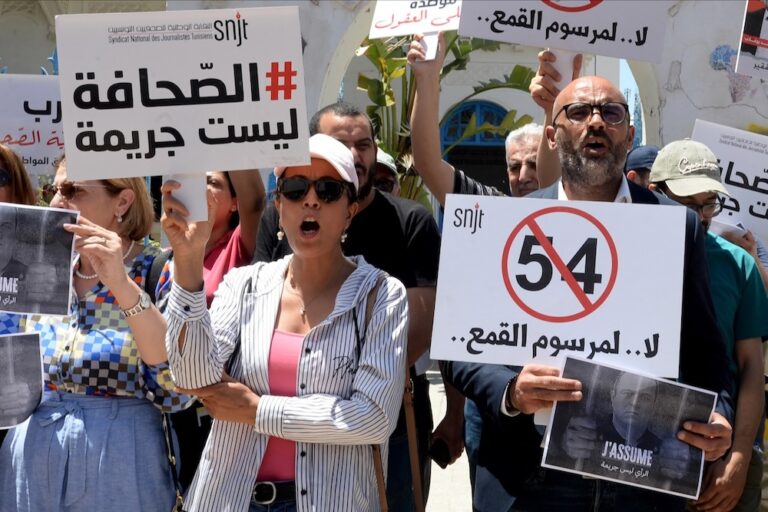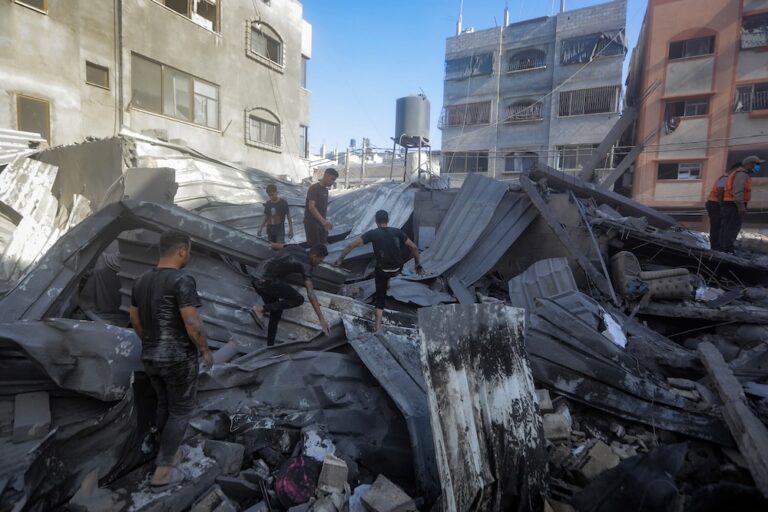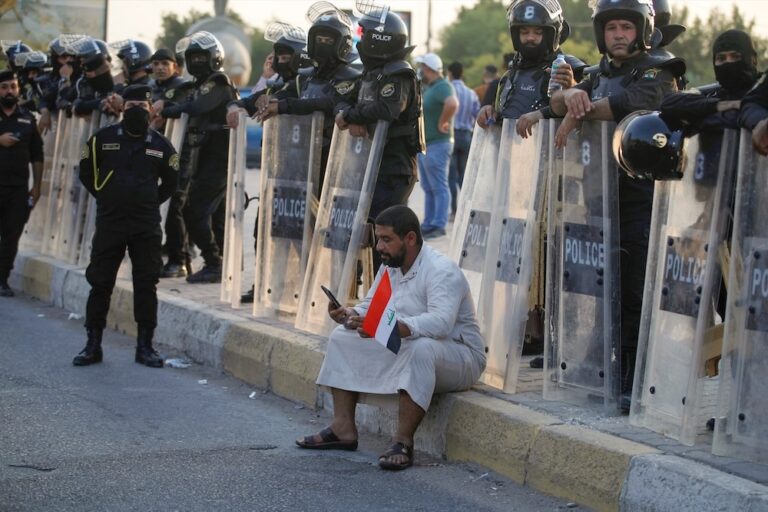March 2023 in Middle East and North Africa: A free expression roundup produced by IFEX's Regional Editor Naseem Tarawnah, based on IFEX member reports and news from the region.
Restrictive laws threaten civil society work in Egypt and Libya, offline and online. Reigning in surveillance technologies, and violent speech targets Palestinians on Israeli social networks.
The erosion of Egypt’s civil society
Civic space continues to shrink in Egypt as authorities seek to enforce the country’s 2019 NGO law forcing civil society organisations (CSOs) to register with the government or face closure and the freezing of their assets.
In a joint letter to US Secretary of State Anthony Blinken, rights groups expressed serious concerns over the law’s restrictions on “civic work”, pointing to vaguely defined terms that allow authorities sweeping interpretations and arbitrary banning of activities deemed “political” or allegedly undermine “national security”.
The rights groups urged the US government to follow through on its strong human rights rhetoric, saying that without significant international pressure, “basic rights and freedoms of Egyptian civil society will be further eroded or denied.”
The dire state of civil society in Egypt was brought into sharp relief last month when an emergency state security court handed down lengthy prison sentences to 29 members of the independent rights group, Egyptian Coordination for Rights and Freedoms (ECRF). The group had been targeted for its work in documenting and publishing human rights violations online, and providing legal assistance to detainees. Many of those sentenced, including the group’s executive director and human rights defender, Ezzat Ghoneim, had already been in prolonged and unlawful pretrial detention since 2018.
The harsh sentences are just one example of the Egyptian authorities’ continued crackdown on dissenting voices. Rights groups also drew attention to the case of Egyptian lyricist and poet Galal El Behairy who launched a hunger strike on 5 March to protest his continued arbitrary detention. Initially facing charges for writing a song critical of the government, El Behairy has been tried in a string of cases since his 2018 arrest in an effort to unlawfully prolong his detention. As highlighted by rights groups in a joint statement calling for the poet’s release, over the past five years, El Behairy had been denied his right to a fair trial and subjected to enforced disappearance, torture and medical negligence that has led to the deterioration of his health.
Egyptian dissidents abroad also continue to deal with abuse by a repressive government back home. A recent Human Rights Watch (HRW) report exposed how Egyptian authorities have systematically refused to provide or renew identity documents for dozens of dissidents, journalists, and human rights activists living abroad in an apparent effort to pressure them to return to likely persecution in Egypt.
“One of the pernicious details we uncovered in our report is how some foreign missions, including the Egyptian Consulate in Istanbul, require citizens accessing services to provide extensive, unnecessary details such as their reason for leaving Egypt and links to their social media accounts. The forms are then sent directly to security agencies in Egypt who approve or deny access to these services.” – Amr Magdi, MENA Senior Researcher at HRW
Three of independent news outlet Mada Masr’s journalists went on trial in March. Rana Mamdouh, Sara Seif Eddin, and Beesan Kassab were referred to an Economic Court on charges of insulting members of parliament and misusing social media, in a case based on the news organisation’s reporting on corruption within the pro-government Mostaqbal Watan Party.
IFEX joined 32 rights groups calling for all charges levelled against the journalists to be dropped and for authorities to end their crackdown on independent media.
Meanwhile, in a rare win for civil society, prominent journalist Khaled El-Balshy was elected as the head of Egypt’s Journalism Syndicate (EJS) during the independent guild’s 17 March election. Editor-in-chief of opposition news website Darb, which is currently blocked in Egypt, El-Balshy ran on a campaign focused on reestablishing the syndicate’s independence and freeing Egypt’s press industry from “the grip of monopolistic powers”.
Libya’s climate of impunity and repressive civil society laws
The ongoing conflict in Libya continues to take a devastating toll on the country’s civic space amidst increasing restrictions on CSOs, media censorship, and arbitrary arrests of activists and journalists.
In a recent report, UN experts concluded that security forces and armed groups may have committed a “wide range of war crimes and crimes against humanity” against Libyans and migrants. The final report of the UN Independent Fact-Finding Mission on Libya (FFM) documents a litany of abuses, including “repression of civic groups, arbitrary detention, murder, rape, enslavement, extrajudicial killing and enforced disappearance.” The report also notes how the EU and its member states have directly or indirectly provided support to Libyan authorities in the interception and return of migrants to detention centres.
The findings of the FFM are in line with concerns expressed by groups including IFEX member the Cairo Institute for Human Rights Studies (CIHRS), which has been calling urgently for accountability to end the climate of impunity. In a joint statement to the EU and its member states, rights groups drew attention to the dire situation in migrant detention centres that are administered by violent militias that operate with impunity.
The groups also called on the EU to press Libyan authorities to end their crackdown on CSOs, and allow rights groups access to migrant detention centres without prior approval by security forces. International and Libyan CSOs have faced increasing restrictions by authorities undermining their right to freedom of association.
In the face of recent efforts to reintroduce a repressive Gaddaffi-era law regulating CSOs in Libya, CIHRS emphasised the urgent need for a law that safeguards freedom of association and enables the work of these groups.
Last month saw Libya’s House of Representatives issue a decree permitting local and international associations in the country to continue working under ‘temporary’ legitimacy until they conform to Law no. 19 of 2001, which grants authorities “sweeping powers to interfere in virtually every aspect of an association’s existence without judicial authorization or oversight”.
Against this backdrop of a vanishing civic space, UN experts have expressed concerns about the potential impact of Libya’s 2022 Anti-Cybercrime Law on the right to freedom of expression and privacy, pointing to provisions in the law that contain vague language and “pose a detrimental threat” to the rights of individuals residing inside and outside of Libya.
HRW has also called for action, urging the House of Representatives to revoke the repressive law and release individuals such as folk singer Ahlam al-Yamani and blogger Haneen al-Abdali, both of whom have been detained since February for violating the cybercrime law and “public morals.”
Digital Lens: Reigning in spyware, Badawi’s ongoing ordeal, and violent online speech targeting Arab and Palestinian communities
Rights groups from the region joined calls on governments convening at last month’s 2023 Summit for Democracy to prioritise human rights due diligence for spyware technologies, citing the dire threats to freedom of expression and human rights posed by the proliferation and abuse of these technologies. Surveillance tools have been used to monitor thousands of critics and dissidents, especially in the MENA region.
The groups urged for greater transparency, accountability, and the implementation of preventative measures, imploring investors to recognize their ethical, normative, and fiduciary responsibilities. Reiterating the critical importance of state regulation of the spyware industry, they stressed how the proliferation of these technologies beyond international human rights standards poses a continuing threat to global security and democracy.
Meanwhile, in Saudi Arabia, a year has passed since prominent Saudi blogger Raif Badawi was released from prison after serving a 10-year sentence for “insulting Islam”, and he is still not allowed to travel or express his views freely. Reporters Without Borders (RSF) has continued to call on Saudi authorities to end his ordeal by lifting all restrictions preventing him from being reunited with his family in Canada.
Badawi’s wife, Ensaf Haidar, said that while he has resumed a semblance of normal life within Saudi Arabia, he has not been able to see his wife and three children who have been living under political asylum in Canada for nearly 12 years. “He is still in prison, the only difference is that he can now move around the country that is imprisoning him,” she told RSF. Badawi is also barred from posting online, using social media, and communicating with the news media, severely curtailing his freedom of expression.
The volume of violent and racist speech targeting Arab and Palestinian communities on Israeli social networks increased by 10% in 2022, reaching 685,000 conversations, according to a report published in March by the Arab Center for the Advancement of Social Media (7amleh). The annual Index of racism and incitement on Israeli social networks found a clear increase in the percentage of racist speech against Arabs and Palestinians, which accounted for 39% of all violent speech. Twitter was the most popular platform for violent speech, accounting for 51% of all such racist conversations.
7amleh called for social media companies to take measures to prevent the spread of such content, reiterating its recommendation for the development of a dictionary of hate speech in the Hebrew language to effectively monitor and manage such content.
New & Noteworthy
In good news, FIFA – the soccer world’s governing body – reversed its decision to partner with Visit Saudi for the 2023 Women’s World Cup, in response to mounting concerns raised by human rights groups and top players about Saudi Arabia’s treatment of women and the LGBTQI+ community. In “an off-field victory for human rights”, HRW called FIFA’s decision a “first step” in its efforts to incorporate human rights.
Iranian journalists Niloofar Hamedi and Elahe Mohammadi won the Lyons Award for Conscience and Integrity in Journalism at Harvard University last month for their “steadfast commitment to producing courageous journalism about issues in Iran affecting women.” Hamedi and Mohammadi were among the first journalists to report on the death of 22-year old Mahsa Amini at the hands of Iran’s morality police. Both have been detained for over six months for their journalism, along with dozens of other women journalists reporting on anti-government protests. In February, Hamedi and Mohammadi also received the Canadian Journalists for Free Expression (CJFE) International Press Freedom Award.
Last but not least, the seventh edition of the Palestine Digital Activism Forum will take place next month from 23 to 25 May. This year’s event will bring together activists, human rights defenders, civil society workers, social media companies, and governments to discuss the impact of discriminatory policies against Palestinians and other marginalized communities around the world, and explore practical proposals to end the systematic digital discrimination.



